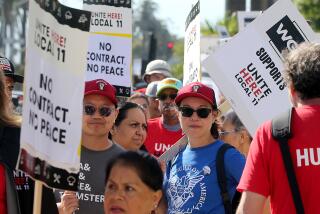AFL-CIO Ends 10-Year Boycott of Coors Beer
- Share via
WASHINGTON — The AFL-CIO ended its contentious 10-year boycott of Coors beer Wednesday, announcing an agreement that for the first time will require the company to allow an expedited union vote at its main Colorado brewery and to employ union workers at any new Coors facility.
AFL-CIO President Lane Kirkland, claiming victory in the agreement with the last major non-union beer company, declared the nationwide boycott “a complete success, a resounding success.”
Kirkland said he expects a renewed labor organizing drive among the eligible 3,100 employees at Coors’ main brewery in Golden, Colo., to begin within a matter of days, leading to a vote “within weeks.”
Joint Statements
The agreement was announced formally in joint statements by Kirkland here and in Denver by officers of Adolph Coors Co., who issued a separate brief statement in the name of Peter Coors, president of brewery operations. The separate Coors statement claimed vindication of the company’s “commitment to employee freedom of choice” regarding union representation.
But Coors officers have conceded that the boycott, which was joined over the years by various special-interest groups opposed to the outspoken political conservatism of Coors family patriarch Joseph Coors, had damaged its main market areas in the West and its drive for nationwide sales.
It was Peter Coors who, on taking over day-to-day operations of the company from his father in 1985, initiated the negotiations with the AFL-CIO that led to Wednesday’s agreement.
In the statement issued here in Kirkland’s name, the AFL-CIO president commended “the more positive approach taken by the current Coors’ management.” He said: “All the strikers who have desired to return to Coors have done so, and the company has taken a series of initiatives to improve its record on employee rights and on individual rights generally.”
The bitter dispute originated in a 1977 strike by Brewery Local 366 and the company’s successful move to fire strikers and decertify the union. The company was accused of racial discrimination and of forcing employees to take polygraph tests, among other things.
Since the boycott began, Coors has attempted to improve its relations with minorities by contributing to charities in the black and Latino communities and through investment agreements with the NAACP and Latino groups. But minority activists often expressed disappointment with those efforts.
Teamsters on Scene
In recent months, the Teamsters Union, which is not affiliated with the AFL-CIO, had emerged on the scene in Golden as a potential organizing force. This posed a potential threat to both the company and the three AFL-CIO affiliates that have expressed interest in organizing Coors workers: the Machinists, the United Auto Workers and the Operating Engineers.
In a statement Wednesday, the Machinists Union said it would open organizing campaigns at Golden and at a new brewery being built at Elkton, Va.
When asked about the Teamsters’ move, Kirkland noted that the AFL-CIO is the only labor federation participating in the agreement committing Coors to an expedited vote on representation if the requisite 30% of the eligible workers at Golden seek such a move.
“It does not cover any other organization,” Kirkland said, carefully avoiding any mention of the Teamsters. “If there is an environment free from coercion,” he added, “I’m convinced they (the workers at Coors) will do the right thing.”
Last Sticking Point
Kirkland said the last sticking point in the long negotiations with the company was the AFL-CIO’s insistence that any new Coors plant should be built by union contractors. Last February, the federation reportedly rejected a Coors proposal that did not yield on that point.
But John Meadows, a Coors executive involved in the negotiations, noted Wednesday that the final agreement will allow the new Virginia plant--and any new facility Coors builds later--to be constructed under a specifically negotiated labor agreement, not necessarily by union contractors exclusively.
Nevertheless, Coors granted major across-the-board concessions in the agreement concluded Wednesday. The AFL-CIO contended that Coors sales in its home area had been devastated by the boycott, with its market share in Colorado plummeting from 47% in 1977 to 22% seven years later and dropping even more sharply in California, to 14% from 44%.
Meadows disputed those figures.
More to Read
Inside the business of entertainment
The Wide Shot brings you news, analysis and insights on everything from streaming wars to production — and what it all means for the future.
You may occasionally receive promotional content from the Los Angeles Times.










